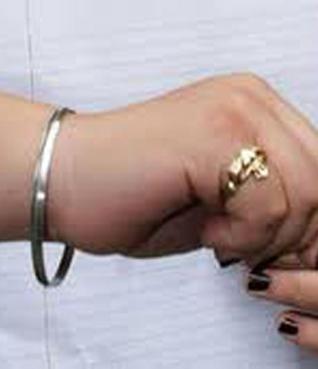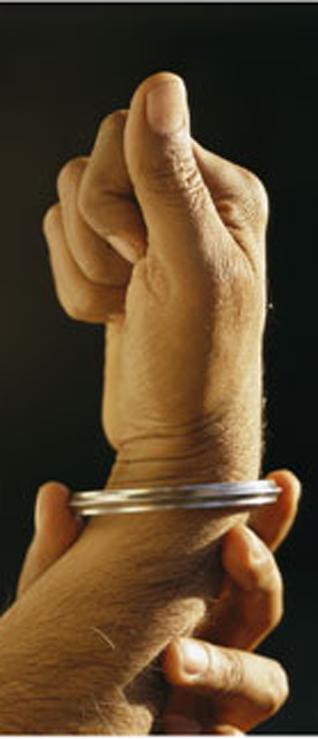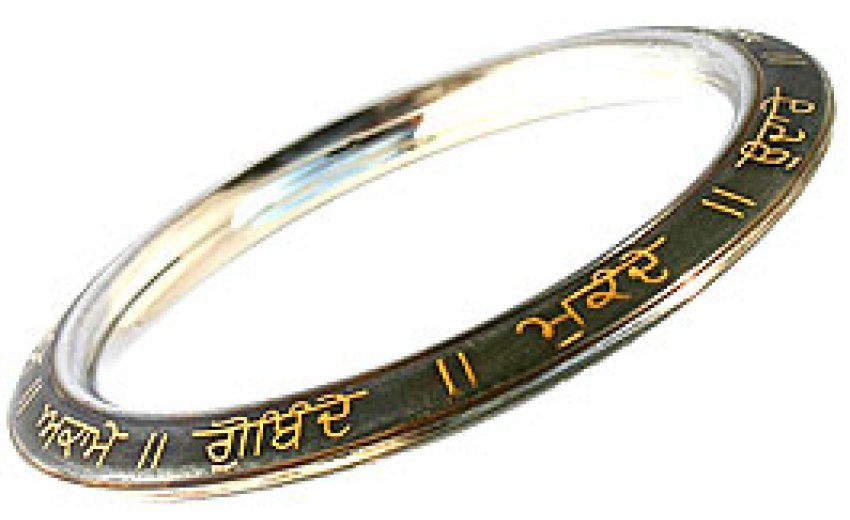 When moving my arms in Zumba, when lifting weights in Body Pump and switching hand positions in Spin, when talking on the phone, when dancing my fingers across the computer keyboard to write, when cleaning or cooking, when waving, I do not think about the symbolism of the circle.
When moving my arms in Zumba, when lifting weights in Body Pump and switching hand positions in Spin, when talking on the phone, when dancing my fingers across the computer keyboard to write, when cleaning or cooking, when waving, I do not think about the symbolism of the circle.
I’m not thinking that it symbolizes infinity with its perfection, or unity because it embraces all the regular polygons, or that a circle serves as engagement and wedding rings.
I fail to consider that the strength of a circle can withstand the strain of any blow, or that the circle represents both freedom and bondage - the freedom that comes from self-discipline and the bondage that comes from being handcuffed or restrained, or the bondage inherent in a bad marriage and the gold circle seal on divorce papers that dissolves it, bringing freedom.
I do not contemplate that a circle represents mobility when it appears as a wheel, or equality and democracy ensuring that everyone sitting at a round table is neither higher nor lower than others.
The zero, a halo and a prayer wheel - all circles - boast no unbroken lines, no beginning, no end, and the solar system offers a veritable festival of circles within circles, a plethora of round objects orbiting each other in a well-choreographed space ballet.
Or that a circle offers protection as long as one stands inside it. And of course, the most familiar circle of all, our own round human faces staring back at us in the mirror, all made in the image of God according to Christian texts, and that God also is represented by a circle, that nameless, shapeless being with no beginning and no end.
Although I do not ponder the circle and its symbolism, I do think about the karra because it gets in the way.
When my friend and guide, Dr. Taranjit Singh, slipped the karra onto my right wrist at the Golden Temple November last, I didn’t expect the steel bangle with Gurmukhi prayers etched into it to develop its own presence.
It has forced me to notice it, dancing up and down my right arm in Zumba and in Body Pump class, glinting under the black lights and jiggling on my wrist during sprints and jumps in the dim Spin room. The karra startles me when it hits my desk top with a jangly thud as I reach for my phone at work; it waves goodbye as I do, and it moves to and fro, up and down my arm as I sweep the floor, load and unload the dishwasher, sort clothes to be laundered, pet the cat.
Not Sikh, I can easily remove the karra, though I do not: I keep it on for a variety of reasons.
The karra reminds me of a phrase learned in Catholic elementary school: “I am the Alpha and the Omega,” the Greek letters, the Biblical God’s own self-description - the beginning and the end, symbolizing eternity.
Karra - an alternate spelling of the Cornish word and the Italian word “cara,” which means “love,” implies by its existence as an article of faith that God is Love, and it is a perfect symbol of God.
My friend Lucky explains that the karra - an article of faith - reminds Sikhs that what they do with their hands should be in keeping with the advice of the Gurus.
Faith - the wholehearted reliance on God and not to be confused with dogma - can be a struggle, especially during trying times, and like the karra, faith sometimes gets in the way.
Or perhaps it’s the other way around and life sometimes gets in the way of faith?
Either way, the karra serves as a simple reminder of what’s important exactly by getting in the way.
 A wavering faith can be toppled by many things, including culture, circumstances, bad advice from well-meaning friends, and misguided focus on the wrong things.
A wavering faith can be toppled by many things, including culture, circumstances, bad advice from well-meaning friends, and misguided focus on the wrong things.
On a macro level, if Sikhism says that men and women are equal, then why do any Sikhs opt to abort female fetuses despite the cultural value that places a greater significance on sons? If wearing a turban requires courage by automatically setting one apart from the masses, then wouldn’t proudly parenting a brood of daughters do the same thing?
If Christianity says murder is wrong, then why would anyone opt to murder abortion-performing doctors or vote to implement the death penalty as a punishment for crimes?
Surely two wrongs wouldn’t make one right.
The Qu’ran stresses that violence against men, women and children is wrong and is considered a sin, yet some imams have no qualms sacrificing other people’s sons and daughters on the altars of their own quest for political power by turning them into suicide bombers. Or emphasizing misguided notions of honor that have nothing to do with faith but which encourage fathers and sons, and sometimes mothers too, to oppress and murder daughters and wives for 'dishonoring' them.
Prophet Muhammad says, “The best among you is the one who is best for his family;” but incidents of domestic violence remains high in fundamentalist Muslim households but also in fundamentalist religious communities of any stripe.
The great underground railroad operating in Baltimore and which ferrets Hasidic Jewish women away from violent partners is nearly legendary and an open secret in the city.
On a micro level, what’s the point of rushing to church on Sundays for services only to be consumed with showing off one’s spiffy clothes and new shoes before assassinating the characters of neighbors, friends, and other congregants in the post-service coffee klatch gossip? Or holding a grudge against someone for a perceived wrong that took place so long ago that neither the grudge holder nor the estranged friend or relative remembers the original circumstances, but just that they hate each other?
So much for faith and worship for a God that is Love.
The intractable messiness of the human condition, doubt, reason, and perhaps thinking individually that we each are unworthy of God’s favor and blessings can play havoc with faith, that ability to wholeheartedly rely upon God, particularly during the toughest times or when we face those times where our faith says one thing but everyone, another.
Patrick Overtone, director of the Front Porch Institute in Astoria, Oregon, U.S.A., said, “When you have come to the edge of all light that you know, and are about to drop off into the darkness of the unknown, faith is knowing that one of two things will happen: There will be something solid to stand on, or you will learn to fly.”
So as the karra gets in the way as I go about my business, rushing to and from work, the gym, and everywhere else, I think of how lucky Sikhs are for the simplicity of this daily reminder of faith, of being part of something larger, of the totality of God, gifted to them by Guru Gobind Singh in 1699, a reminder of protection, that even when it feels as if the next step will be a drop into an abyss, that something solid will be there to stand on, or that wings hidden in hearts and souls will unfurl and not only fly but soar.
NOTE:
'Karra' also means strict and the associated word 'karri' also means handcuff (hath-karri). Looked at from this angle, the bangle on the right hand shows one's discipline.
That is, one is not free to do anything one likes, but one has to remain under some wholesome boundaries. Like a true Christian, one says, "Under wholesome restrictions I find perfect freedom."
This sounds a bit paradoxical, but so is most wisdom paradoxical.
It is steering between two dangers, that is why the Master sprinkled the elixir (Amrit) into the eyes of his followers, so that the Khalsa (True Followers) are enabled to receive the divine vision. A person is free to the degree to which he is responsible. An irresponsible person would find himself in trouble sooner or later. He cannot remain free and escape the law of a responsible society.
For example, a careful and responsible driver who obeys the set rules drives freely, but who does not obey the rules or who does not know the rules, or who is a learner, is always under a strain and cannot drive freely.
In Islam 'Mussalman' means a person who submits himself to the will of God. Thus the bangle on the right wrist of a Sikh enables him to have the good qualities of a true Christian, a holy Muslim and a pure Sikh (Khalsa) merged into one.
What a wonderful gift from our unfathomable Master, Guru Gobind Singh!
